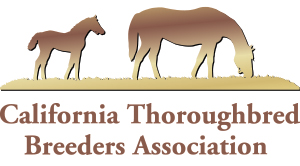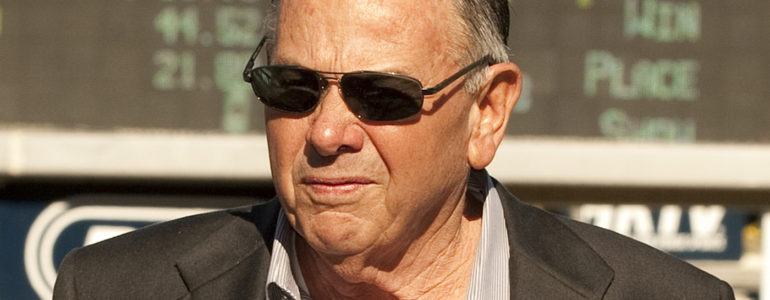From Santa Anita Publicity
ARCADIA, Calif. (March 2, 2023)–Safe to say Bill Spawr, 83, who announced earlier this week that he had disbanded his stable, perhaps did more with less over a remarkable 46-year career as a public trainer than most all of his contemporaries.
A star running back at Downey High School who got hooked on racing while working as a part time clerk in a local liquor store that served up Daily Racing Form, Bill Spawr, who was born on Dec. 13, 1939 in Bell, CA, gravitated to the racetrack full-time at age 23 and gained invaluable experience as a veterinarian assistant for 14 years, prior to forming a public stable in 1977.
Although he was never positioned to receive a steady influx of well-bred talent, Spawr’s successes came largely through the claim box and via a time-tested formula for doing well—hard work. With 1,709 career wins, Spawr amassed two Winter/Spring training titles at Santa Anita, in 1991 and 1996, two titles at the track’s Oak Tree Meeting, in 2000 and 2001, as well as a pair of summer titles at Del Mar, in 1990 and 1994.
Early to rise and tight-lipped, Spawr was typically the first trainer on the beat at any racetrack, often arriving between 2:30 a.m. and 3 a.m.
“I treated them as individuals,” said Spawr. “Charlie Whittingham taught me, there’s not two the same. They’re all different and he was so right.”
Following morning training, Spawr was an indefatigable presence at the track during afternoon racing, diligently marking legs of prospective claiming prospects and documenting observations regarding fluidity of movement, riding tactics employed, attitude and more.
“I always wanted to check their legs, to see if they may’ve changed since the last time they ran,” he said. “And the body, the hair, which can tell you a lot. I even marked the kind of bridle they were running in. The type of blinkers, if they had a tongue tie. If they ran with a nose band. All this stuff told me the temperament of the horse.
“For instance, if the horse is running with a ring bit, he’s tough. If he’s got a D-bit or snaffle, he’s easier. If a horse has an outside prong with an outside extension, then you go, ‘Wow, this horse is getting out pretty good…’
“And another very important aspect of what we did was that Darryl (Radar, longtime assistant) and I watched them train. If they’re in a steady pattern galloping every day and working every week, fine. But if all of a sudden, all they do is jog or go with the pony and they drop in class, a warning light goes on.”
For Spawr, horse racing was more however, than just equine x’s and o’s—he frequently had a cadre of like-minded handicappers, often comprised in-part of local baseball, football and basketball coaches that liked the comradery of hanging out at the track, having a few beers and on occasion, cashing a few bets.
“We had like a following,” said Spawr. “Especially on the weekends and especially when I rode Laffit (Pincay, Jr.). I had fans that would come to me and they’d say, ‘I got off work because Laffit’s riding your horse!’ That happened a lot. We won a lot of races together, Laffit and my stable.”
Spawr’s successes via the claimbox are legendary, beginning with a Florida-bred gelding named Restage, who he claimed on Aug. 11, 1984 for $16,000 and with whom he won 13 races, a pair of minor stakes and more than $200,000.
From there, Spawr’s hit parade included California-bred My Sonny Boy, who he haltered for $62,500 and with whom he won the 1990 California Cup Classic, with Jorge Velazquez literally being hailed out of the parking lot as a last minute replacement for Patrick Valenzuela.
Yet another Cal-bred touchdown for Spawr came with Sensational Star, a chestnut gelding by Inherent Star that he claimed for $32,000 on Aug. 7, 1988. Ridden primarily by Rafael Meza, Sensational Star would go on to win three stakes and bank more than $440,000.
One of his all-time best purchases was Exchange, a 4-year-old Ontario Canadian-bred filly by Explodent that he claimed out of her second start on May 2, 1991 for $50,000. With Pincay at the controls, Exchange would go on to win Santa Anita’s Grade I Santa Ana and Santa Barbara Handicaps in 1993 as well as Hollywood Park’s Grade I Matriarch in 1994 and earned more than $1.2 million.
Owned and bred by longtime clients Fred Carillo and Daniel Casella, Bordonaro, a California-bred gelding by Memo, broke his maiden for a $32,000 tag and would go on to win Santa Anita’s Grade I Ancient Title Handicap on Oct. 7, 2006 as well as five other stakes while banking nearly $940,000.
The highlight of Bill Spawr’s career came with yet another California-bred, a Northern Afleet gelding foaled in 2006 named Amazombie, with whom Spawr and co-owner Tom Sanford would win the 2011 Breeders’ Cup Sprint at Churchill Downs. Although he didn’t come to Spawr’s stable via the claimbox, Amazombie was nonetheless the epitome of a bargain basement purchase.
“We were at a farm owned by Judd Morse out in Hemet and it was a cold morning,” recalled Spawr. “And this group of 2-year-olds was walking by and Judd said, ‘Hey, look at these two horses, they’ve both been to the track and they’re for sale.’ I said, ‘I haven’t got no money.’ Then he told me, ‘The man died and his family doesn’t want any horses, so you can probably get ’em cheap.’
“I told him again that I didn’t have any money, but he insisted I look at them. So now I figure, I’m gonna make him stop, so I said, ‘Okay, which one of these two is the best one?’ So he pointed one of ’em out and he told me they both had some pedigree. So I told him, ‘Tell the people I’ll give $5,000.’
“So Judd calls me a couple days later and says, ‘They’ll take it.’ So I called my bookkeeper and he found me the $5,000. So a few days go by and Judd calls and says, ‘Hey Bill, they’re going to be in tomorrow.’ I said, ‘There’s no THEY, I bought ONE.’ So Judd told me I said ‘THEM.’
“What I said was ‘I’ll take HIM,’ but anyway, the other horse was Amazombie, so I got him for FREE.” And the rest as they say, is racing history, as Amazombie would win eight stakes, three of them Grade I’s and bank $1,920,378 from an overall race record of 29-12-5-6.
When asked what it’s now like to transition into the role of equine consultant, Spawr said, “I feel very comfortable, especially with what’s going on in racing…To me, I can’t do the things I used to do…Some people…They don’t understand horsemanship.
“Right now, I’m going to take a deep breath. I’m gonna be very active. I own small pieces of a couple of horses…I’ll be out there in the morning. I need something to do, I’ve had a couple of my owners ask me to keep an out for horses to claim, so I’ll keep my leg markings going…I don’t want any money for it, I just want something to do.”
Spawr, who had 11 horses remaining, said that they were disbursed between four trainers, Phil D’Amato, Jeff Bonde, Dean Pederson and Brad Cox.
And following roughly 60 years in the racetrack trenches, 46 of them as a public trainer, how would Bill Spawr like to be remembered?
“As a good horseman. As a guy that really cared about the horses, first.”


